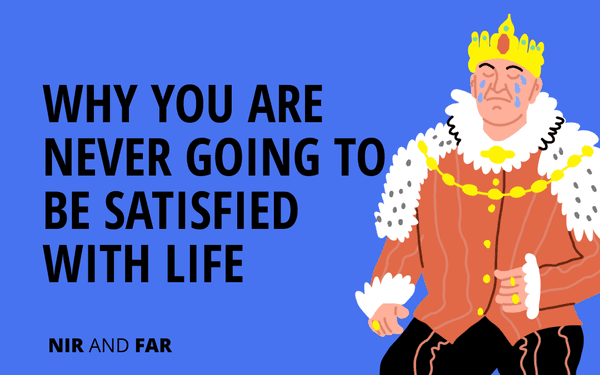Why We’re Never Going to Be Satisfied With Life
Curated from: nirandfar.com
Ideas, facts & insights covering these topics:
8 ideas
·1.6K reads
12
Explore the World's Best Ideas
Join today and uncover 100+ curated journeys from 50+ topics. Unlock access to our mobile app with extensive features.
Why Are We Perpetually Restless And Unsatisfied?
There’s a simple reason for that: as expressed by researchers for the Review of General Psychology, “If satisfaction and pleasure were permanent, there might be little incentive to continue seeking further benefits or advances.”
In other words, feeling contented wasn’t good for the species.
Our ancestors worked harder and strove further because they evolved to be perpetually perturbed, and so we remain today.
27
363 reads
The 4 Components of Dissatisfaction
Or, the 4 psychological factors that make satisfaction temporary.
- Boredom
- Negativity Bias
- Rumination
- Hedonic Adaptation
Taken together, these 4 components add up to a lot of dissatisfaction in life, even if our circumstances are truly great.
As the author of one study explains, as “new goals continually capture one’s attention, one constantly strives to be happy without realizing that in the long run such efforts are futile.”
Humans may be wired to pursue happiness, but we’re not too well equipped to experience it.
24
217 reads
Dissatisfaction Factor #1: Boredom
The lengths people will go to avoid boredom are shocking. Literally.
A 2014 study published in Science observed participants who were asked to sit in a room and think for fifteen minutes. The room was empty except for a device that allowed participants to mildly but painfully electrocute themselves.
“Why would anyone want to do that?” you might ask.
The study demonstrated that people dislike being alone with their thoughts so much, they’ll prefer to do anything else, even if that activity is negative.
24
203 reads
Dissatisfaction Factor #2: Negativity Bias
It’s been defined as “a phenomenon in which negative events are more salient and demand attention more powerfully than neutral or positive events.”
Such pessimism begins very early in life. Babies begin to show signs of negativity bias starting at just 7 months of age, suggesting this tendency is inborn.
As the author of one study concluded, “It appears to be a basic, pervasive fact of psychology that bad is stronger than good.” Good things are nice, but bad things can kill you. That’s why we pay attention to the bad stuff first and remember it better.
23
170 reads
Dissatisfaction Factor #3: Rumination
If you’ve ever chewed on something that you did, or that someone did to you, over and over again, then you’ve experienced rumination, which is our tendency to keep thinking about bad experiences.
This “passive comparison of one’s current situation with some unachieved standard,” can manifest in self-critical thoughts such as, “Why can’t I handle things better?”
As one study notes, “By reflecting on what went wrong and how to rectify it, people may be able to discover sources of error or alternative strategies, ultimately leading to not repeating mistakes and possibly doing better in the future.”
24
175 reads
Dissatisfaction Factor #4: Hedonic Adaptation
Hedonic adaptation is the tendency to quickly return to a baseline level of satisfaction no matter what happens to us in life and may be the cruelest of all 4 factors.
Hedonic adaptation is Mother Nature’s bait-and-switch. All sorts of life events we think would make us happier actually don’t—or at least, not for long.
As David Myers writes in The Pursuit Of Happiness, “Every desirable experience—passionate love, a spiritual high, the pleasure of a new possession, the exhilaration of success—is transitory.”
22
168 reads
Dissatisfaction Is Energy
Dissatisfaction is responsible for our species’ advancements, and if you never felt it, you’d be at a serious disadvantage. Discontent is not a reason to give up on success. Rather, it’s a reason to introduce the opportunity for frequent and meaningful victories into our lives.
Every day is a chance to live according to our values, which Nir Eyal defines as “attributes of the person we want to be”. Living out our values means spending our time purposefully on the things that we decide are important.
25
154 reads
How We Can Live Out Our Values
We can live out our values—very concretely—if we build our values into our calendar. That “simply” means scheduling time for what matters most. By turning our values into time, we make sure we have time for traction.
At the end of the day, we can look at what we intended to do, compare it to what we ended up doing, and celebrate our victory when we stayed on track.
If you (still) find yourself feeling unhappy with life, that doesn’t mean you’ve been defeated.
The takeaway here is that if you’re unhappy, you’re normal.
27
150 reads
IDEAS CURATED BY
CURATOR'S NOTE
The 18th century poet Samuel Johnson said, “My life is one long escape from myself.” Sounds “‘mad, bad and sad”? The truth is, we’re not wired to feel content or satisfied. Ever. Here’s the surprising psychology of why dissatisfaction is hardwired and why that’s a good thing.
“
Xarikleia 's ideas are part of this journey:
Learn more about mentalhealth with this collection
How to practice self-compassion
How to identify and challenge negative self-talk
How to build self-confidence
Related collections
Similar ideas
8 ideas
8 ideas
7 Cognitive Biases That Make Us Suck at Time Management
blog.doist.com
3 ideas
Why reaching your goals won't make you happier
fastcompany.com
Read & Learn
20x Faster
without
deepstash
with
deepstash
with
deepstash
Personalized microlearning
—
100+ Learning Journeys
—
Access to 200,000+ ideas
—
Access to the mobile app
—
Unlimited idea saving
—
—
Unlimited history
—
—
Unlimited listening to ideas
—
—
Downloading & offline access
—
—
Supercharge your mind with one idea per day
Enter your email and spend 1 minute every day to learn something new.
I agree to receive email updates
